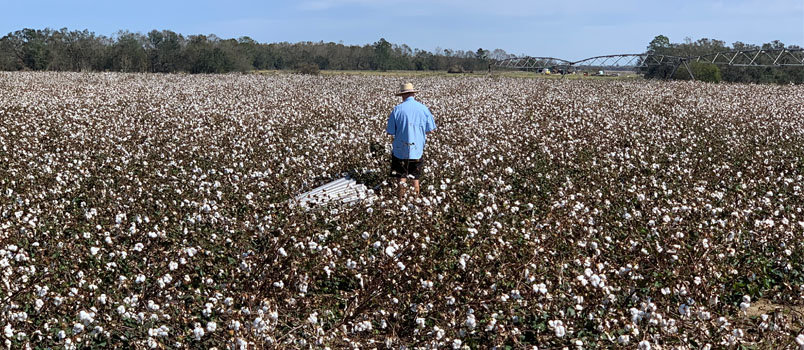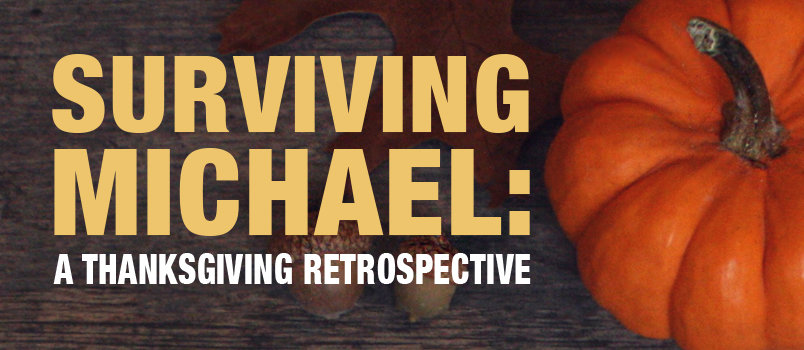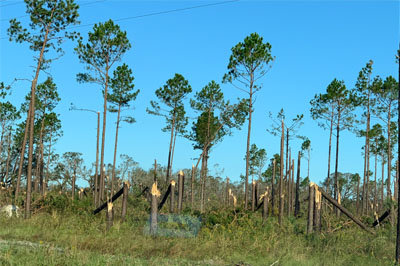 Keith Bowen, a deacon at Rocky Ridge Baptist Church outside of Donalsonville, wonders if his cotton will survive harvesting this year. The cotton was waist high the afternoon of the storm; by morning it was barely up to his knees. A piece of aluminum roofing torn from his nearby church lays at his feet. JOE WESTBURY/Index[/caption]
Keith Bowen, a deacon at Rocky Ridge Baptist Church outside of Donalsonville, wonders if his cotton will survive harvesting this year. The cotton was waist high the afternoon of the storm; by morning it was barely up to his knees. A piece of aluminum roofing torn from his nearby church lays at his feet. JOE WESTBURY/Index[/caption] This is the first in a five-part series of Thanksgiving Week conversations with survivors of Hurricane Michael. The interviews, titled "Surviving Michael: A Thanksgiving Retrospective," explore the faith that saw everyday individuals through the eye of a Category 3 storm.
Among the many things to be thankful for this Thanksgiving season – friends, family, and faith – it might be a good time to include the farmer.
This week, many Georgia Baptists who provide crops for our tables and cotton for our backs are struggling in the wake of Hurricane Michael. The Category 5 storm plowed through their fields just north of the Florida Panhandle in October, just as their crops were ready for harvest.
 The media networks have moved on to other disasters but the destruction remains a daily reminder of what they had and what they lost in a matter of minutes.
The media networks have moved on to other disasters but the destruction remains a daily reminder of what they had and what they lost in a matter of minutes.
Thousands of mighty pecan trees lie on their sides, a century of growth destined for the wood pile. Future harvests, if the orchards are replanted, will not be seen for at least a decade.
Shortly after the storm, peanuts were harvested but had to be field dried because gas lines at the processing plants were severed and unable to dry the crops. Rain at that vulnerable time threatened to reduce the harvest even further.
Cotton, its hard bolls just beginning to open into its valuable fluffy bloom, was pummeled to the ground, mud mixing in with the white bloom and making it worthless. In some instances where the crop had not bloomed, the torrential rain and wind so rearranged the fields that farmers could not see if their rows ran east or west or north or south. That meant machinery could not find its way to harvest the crop without destroying it in the process.
 Refrigerators remain empty in homes this Thanksgiving, their contents long ago tossed after power grids were destroyed by the wind. Hundreds of homes remain uninhabitable due to structural damage. JOE WESTBURY/Index
Refrigerators remain empty in homes this Thanksgiving, their contents long ago tossed after power grids were destroyed by the wind. Hundreds of homes remain uninhabitable due to structural damage. JOE WESTBURY/IndexIt’s the faith of farmers like Jackie and Bonnie Frith that can teach lessons for all of us as we sit down to a bountiful table this coming Thursday.
Farming roots run deep in the Frith family, much as it does for many Georgia Baptists in this rural area of the state. If a family itself does not farm, its income flows from employment in the plants that process the crops, or the cotton gins, or the harvest itself.
It’s a tightly connected economy that is interwoven into their daily existence like the cotton that comes from the looms in different parts of the nation. It’s how they clothe their children, pay their bills, save for Christmas and provide for the annual Thanksgiving bounty on their tables. This year many will not even have tables around which to gather, their homes severely damaged or condemned.
Jackie Frith and his brother inherited the farming gene from their father and, in their younger days, kept the farm going for their mother after their father’s death. They each branched off into more stable professions but never gave it up completely. It’s in their blood, as they say.
 Cotton and pecan trees were no match for 125 mile per hour winds that snapped entire pine forests like match sticks. JOE WESTBURY/Index
Cotton and pecan trees were no match for 125 mile per hour winds that snapped entire pine forests like match sticks. JOE WESTBURY/IndexJackie, now retired, had a successful career in management with the local paper mill but has always lived on a farm. He still has some cows but is no longer involved with row crops. Perhaps his biggest investment is in the 50 acres of century-old pecan trees which provide a bountiful crop of the Southern delicacy each fall… right around hurricane season.
But hurricanes are not common in this part of the state. Tropical storms, yes. But not full-throated storms which cease to break apart like Michael refused to do, dragging itself out of the Gulf and across the state with winds of 125 miles per hour. It was unrelenting with its fury and most likely will be one of those rare storms whose name is retired, never to be used again.
On my Index coverage I met Jackie and Bonnie, members of Springfield Baptist Church who celebrated their 60thwedding anniversary on Oct. 24. Then just a few miles away I met another Georgia Baptist couple, Keith and Jujuan Bowen of Rocky Ridge Baptist Church, who farm cotton and peanuts as well as run a popular barbeque business.
As we close in on the Thanksgiving season this week, I want to introduce you tomorrow to these two couples in an introductory story titled “The Faith of Farmers.” Then on Tuesday and ending on Thanksgiving Day, I want you to meet 6 other Michael survivors in a special series that focuses on what they are thankful for this season.
 Ronnie Welch of Springfield Baptist Church sits in the living room, with insulation handing from the ceiling and sunlight shining through, where he and his wife were sitting as the storm ripped off large portions of the roof. One of the first things to do was unload the refrigerator as food began to spoil. JOE WESTBURY/Index
Ronnie Welch of Springfield Baptist Church sits in the living room, with insulation handing from the ceiling and sunlight shining through, where he and his wife were sitting as the storm ripped off large portions of the roof. One of the first things to do was unload the refrigerator as food began to spoil. JOE WESTBURY/IndexFor 40 years I have been covering Southern Baptist Disaster Relief from Galveston, TX, throughout Georgia, and as far away as Mexico City where 20,000 people died in an earthquake. But rarely have I seen a storm so ravage crops over such a wide area.
That’s why I am beginning this week’s coverage, called "Surviving Michael: A Thanksgiving Perspective," with looking at life through the eyes of those who risk their livelihood to provide us with food and clothing. They will get by. They always have. But it’s times like these that test the faith of farmers.
As we sit down on Thursday around a bountiful table, may we remember our farming friends who truly are the unsung heroes of our daily lives. And, may God bless the farmer and his faith.